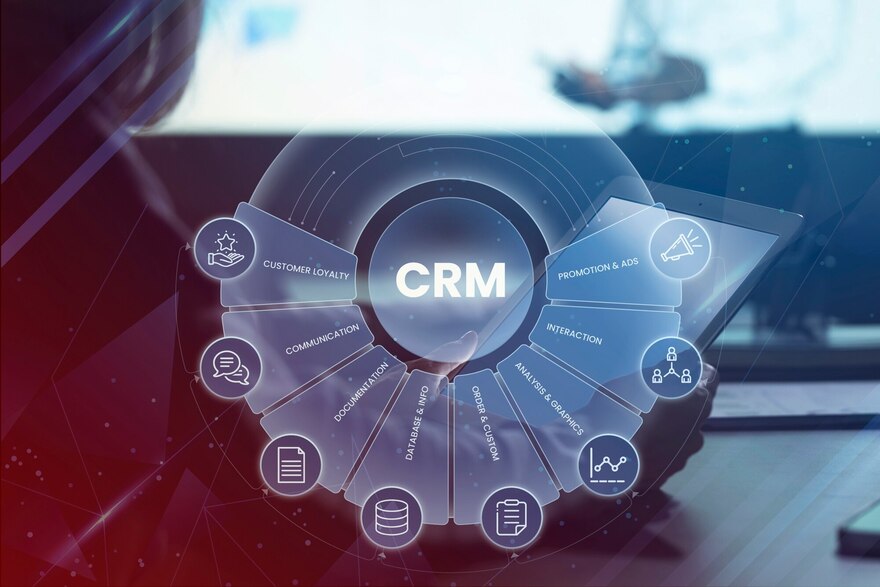Oct 1, 2024
Best CRM for One Person
In a world of endless connections, tracking your relationships is tough. It’s like trying to catch smoke with your bare hands. As your list of friends, family, and colleagues grows, it can be tough. Navigating those interactions can quickly become overwhelming. Enter the personal CRM. It’s a nifty tool for those who want to improve their communication and relationships. Imagine all the important details about your connections in one place: their birthdays, interests, and past chats.
![]()
What is a Personal CRM and Why Do You Need One?
A personal CRM, or Customer Relationship Management tool, helps you manage your connections. It helps you nurture them, too. It is for both personal and professional use. Unlike traditional CRMs, a personal CRM centers on you as an individual. Traditional CRM focus on businesses. Imagine having a digital assistant dedicated solely to maintaining your relationships. This means tracking birthdays, remembering key chats, and setting reminders for follow-ups.
All in one place. Why do you need one? Life moves fast, making it easy to lose touch with people who matter. A personal CRM ensures that no connection slips through the cracks. It helps build deeper relationships. It does this by prompting meaningful interactions, not just relying on chance. With the right tools, keeping up with friends and colleagues can be fun!
Understanding Customer Relationship Management for Personal Use
Customer Relationship Management isn’t just for businesses. It’s a powerful tool for personal use, enhancing how you manage relationships. Personal CRM is, at its core, about organizing interactions with friends and family. Think of it as your** digital Rolodex** that evolves over time. Instead of merely storing contacts, it helps track conversations and important dates.
Imagine remembering birthdays or noting shared interests effortlessly. A well-structured system can transform casual connections into meaningful relationships. Whether you’re networking or nurturing friendships, a personal CRM keeps everything tidy. It ensures that no relationship falls through the cracks amidst life’s chaos. In our fast-paced world, staying connected is vital. Using CRM principles empowers you. It helps you engage more thoughtfully with those around you.
Benefits of Using a Personal CRM Tool
Using an individual CRM can transform how you manage relationships. It helps keep your contacts organized, ensuring that no one slips through the cracks. With a CRM, you have all essential information at your fingertips. You can store notes about conversations and reminders for follow-ups. This level of organization fosters stronger connections with friends, family, and professional contacts.
Another benefit is time-saving automation. Scheduling reminders or sending emails becomes effortless. You spend less time managing tasks and more on nurturing your relationships. Personal CRMs also allow for better prioritization.
By categorizing contacts by their importance, you can focus on what matters most. These tools provide insights into interaction patterns over time. Knowing your connections helps improve engagement in both personal and professional relationships areas. It keeps you from feeling overwhelmed.
How Personal CRM Software Improves Relationship Management
Personal CRM software transforms the way you managerelationships. It provides a single place for all your contacts. No need to rely on memory or scattered notes. With features like reminders and follow-up tasks, you can maintain consistent communication. It makes sure important dates, like birthdays and anniversaries, are never missed.
Insights generated from interactions allow for tailored conversations. You can track preferences and interests to personalize future engagements effectively. Visual dashboards help in organizing your network visually. This makes it easier to identify key connections and nurture them over time.
By using automation tools within personal CRMs, routine tasks become more manageable. You save time while enhancing interaction quality. These systems foster deeper connections by promoting intentionality in relationship management.

How to Choose the Best Personal CRM Software?
Choosing the right individual CRM software can feel overwhelming. Start by identifying your specific needs. Are you looking to manage contacts, track interactions, or schedule reminders? Next, consider usability. A user-friendly interface saves time and enhances productivity. Look for tools that offer intuitive navigation without unnecessarycomplexity. Integration capabilities are also crucial. Make sure the CRM connects with your other apps, like email and calendars. This will streamline your workflow. Don’t overlook scalability. Choose software that can grow with you as your network expands. Even if you’re a one-person operation now. Take advantage of free trials whenever possible. Testing different CRM platforms helps find the features you like best before committing. To help you get started, here are
10 best personal crm tools available:
- Corcava
- Dex
- Clay
- Monica
- Covve
- Queue
- Nimble
- Cloze
- Airtable
- Notion
Key Features to Look For in a Personal CRM System
When searching for a personal CRM system, focus on CRM features that cater to your unique needs. Customizable fields allow you to tailor the platform to your relationships. Consider integration capabilities with other tools. A good CRM should sync with email and calendar apps. It should streamline your workflow.
Automation is another crucial aspect. Look for tools to automate reminders and follow-ups. This will prevent any important connections from slipping through the cracks.
User-friendly design shouldn’t be overlooked. An intuitiveinterface makes navigation easier and cuts the learning curve. This is vital if you’re managing everything solo. Mobile accessibility enhances convenience. A responsive app ensures you stay connected with your contacts on-the-go. These features create a powerful tool tailored just for you.
Ease of Use: Why It Matters for Single Users
When choosing a personal CRM, ease of use is paramount for single users. You’re likely wearing many hats. It can be frustrating to learn complicated systems. An intuitive interface lets you dive in without training or manuals. You want to add contacts, set reminders, and track interactions quickly and easily. Look for features that simplify tasks.
Drag-and-drop or one-click access can save you time. A straightforwarddashboard makes it easy to visualize your relationships at a glance. Also consider mobile accessibility. Being able to manage connections on the go adds convenience. This keeps you organized wherever life takes you.
Comparing Free vs Paid Personal CRM Solutions
Free CRMs offer basic contact management and reminders without financial commitment, but often cap features or integrations. Paid CRMs add automation, analytics, and better support—saving time and scaling with your network.

What are the Top Personal CRM Apps in 2024?
Among individual CRM apps, several stand out: Nimble integrates social media well; Cloze sends smart reminders based on past interactions; Monica offers a simple, open-source approach; Streak lives inside Gmail for email-centric workflows.
Overview of the Best Personal CRM Apps Available
- Cloze: Automates tracking across email, calls, meetings and ranks contacts by engagement.
- Contacts+: Simple contact management with strong search and efficiency focus.
- HubSpot (free tier): Versatile, usable for personal relationship management.
Comparative Analysis of Free CRM Software Options
- HubSpot CRM: Intuitive navigation; essential tools for interactions.
- Zoho CRM: Customizable dashboard to surface what matters.
- Streak: Gmail integration for streamlined email workflows.
Free tiers are capable but typically limit advanced features, storage, or integrations.
User Ratings and Reviews of Top Personal CRM Tools
Users praise customization and simplicity; common critiques include free‑tier limits and minimal support. Fast, helpful support materially improves experience.

How to Effectively Use a Personal CRM?
Start with clear goals (networking, friendships, clients). Customize your dashboard fields (birthdays, interests, recent conversations). Update notes consistently; use reminders for follow-ups; integrate calendars/tasks to streamline workflow.
Setting Up Your CRM for Personal Relationships
Import contacts and sync email/social. Prioritize by importance and interaction cadence.
Add notes for each contact (memorable talks, birthdays, interests). Set reminders for key dates.
Best Practices for Keeping Track of Personal Contacts
| Practice | Description |
|---|---|
| Centralized Contact Management | Use one platform to avoid duplication and confusion. |
| Regular Updates | Periodically review details (phones, emails, addresses). |
| Categorization | Group by family, friends, colleagues, acquaintances. |
| Notes & Context | Add how/where you met and common interests. |
| Use Cloud Backup | Sync to Google Contacts, iCloud, or Outlook. |
| Keep Digital & Physical Backups | Maintain CSV export and printed backup. |
| Link Social Media Profiles | Stay updated on contacts’ activities. |
| Set Reminders for Key Dates | Birthdays, anniversaries, follow-ups. |
| Merge Duplicate Contacts | Regularly dedupe to keep lists clean. |
| Use Privacy Filters | Lock sensitive info with app privacy controls. |
| Export & Import Safely | Encrypt/handle securely when moving data. |
Integrating Your CRM with Other Tools and Apps
Sync email, calendar, and tasks to centralize interactions and automate data entry. Popular connectors include Google Workspace, Outlook, and Slack. Link social accounts to catch important updates.
What is the Best Free Personal CRM Solution?
Strong free options include HubSpot (contact mgmt, email tracking, task automation), Streak (inside Gmail), Nimble (social integration/contact enrichment), and Bitrix24 (customization in a free tier).
Top Features of Free CRM for Solopreneurs
Essential: contact management, user-friendly interface, analytics for interaction trends, and simple automations.
Limitations of Free Plans: What to Expect
Free tiers may cap contacts/notes, limit customization/integrations, and offer minimal support.
User Experience with Free Personal CRM Tools
Free tools help organize connections on a budget, but limits can frustrate growing needs.
Can a Personal CRM Benefit Small Business Owners?
Personal CRM streamlines interactions, follow-ups, and note-tracking to close deals and tailor offers. Automation frees time; insights guide offerings and marketing.
Utilizing Personal CRM for Small Business Growth
Categorize contacts, automate reminders, and target communication to drive satisfaction and growth.
Choosing a CRM Solution Tailored for Solopreneurs
Prioritize simplicity, customization to your workflow, integrations with daily tools, and scalability. Use free trials to validate fit.
Are There Simple CRM Options for Single Users?
Simple CRMs focus on essentials (contacts, interactions) with intuitive interfaces and optional custom fields.
Advantages of Simple CRM Systems for Individuals
Streamlined UI reduces friction, making it easy to add contacts, set reminders, and track interactions without feature overload.
How to Find a CRM That Meets Your Business Needs
Define interaction patterns and must‑have features, ensure integrations, test via trials/demos, and confirm UI doesn’t hinder productivity.
Exploring Traditional vs Modern CRM Tools for Personal Use
Traditional CRMs emphasize pipelines and can feel heavy. Modern tools add tagging, reminders, and social linking for individual use. Choose what augments, not complicates, your flow.

